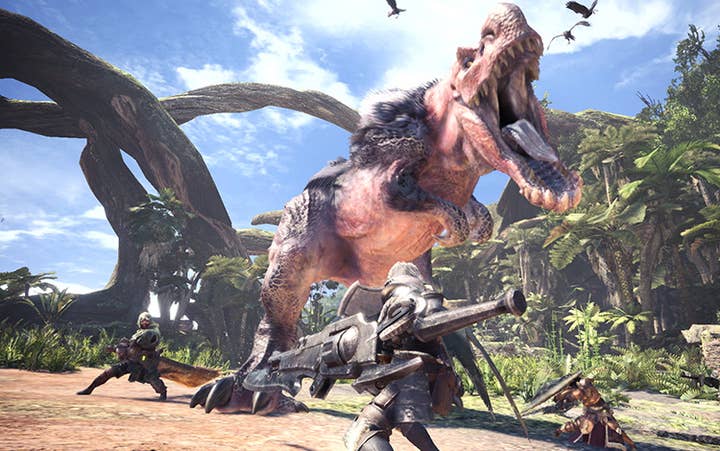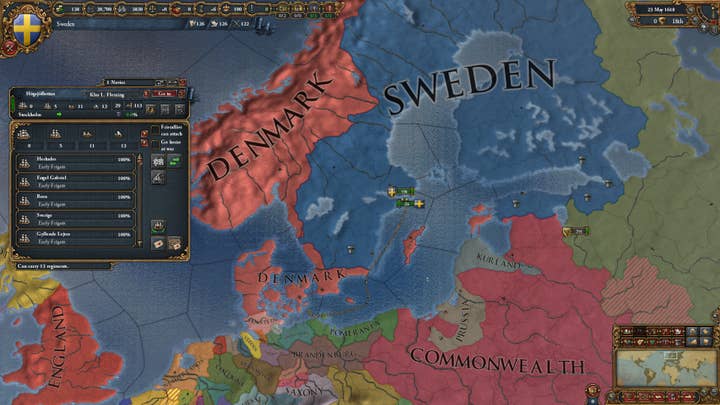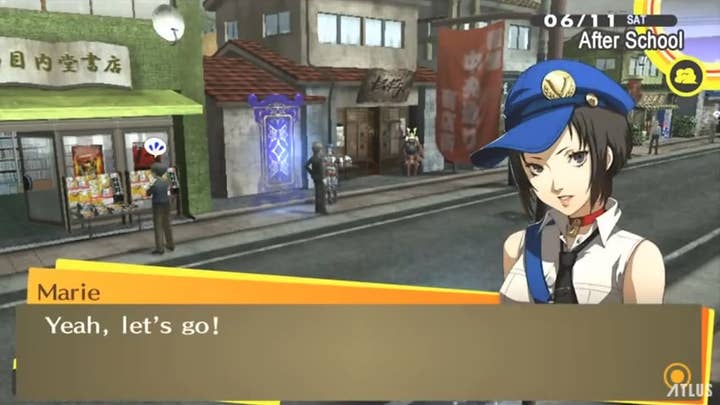Monsters, mundanity, history, and high school
Why I Love: Skydance Interactive devs on Monster Hunter: World, Every Day the Same Dream, Europa Universalis IV, and Persona 4 Golden
Why I Love is a series of guest editorials on GamesIndustry.biz intended to showcase the ways in which game developers appreciate each other's work. Development is typically a team effort, so from time to time, these columns will reflect that. Some of the Skydance Interactive team recently took a break from their work on Archangel and The Walking Dead VR to provide Why I Love write-ups for some of their favorite games, but the resulting lovefest was simply too much to cram into a single column. Rather than edit any of the write-ups for length, we're going to run them over two separate columns, one today and one in two weeks.
Monster Hunter: World
Guy Costantini - Vice President, Global Interactive Marketing

When I learned about this Why I Love piece, I knew it was time to reveal my latest obsession: Monster Hunter: World. As someone who has worked both on multiplayer games (League of Legends) and amazing monster hunting adventures (The Witcher 3), I immediately clicked with this incredibly fun Capcom franchise. I first heard about it from my good friends when they were all playing on the DS. As a World of Warcraft player, I was feeling super left out. I kept hearing about its history of epic complexity and difficulty, so when I heard it was coming to PS4, I jumped hard on the bandwagon. Many Tempered Bazels later, I feel like I am finally approaching the late game.
As a games marketer and community builder, I love falling in love with games like Monster Hunter because they confirm what most people instinctively know. If it's great and your friends are playing, then you have the making of a top game on your hands. Since my job has been to take that kind of 'game magic' and get as many people as possible to experience it, I am always keeping an eye on games of this kind. In this particular case, Capcom has also hit many cool executions during launch with cross-over gear featuring some other awesome franchises like Street Fighter and Horizon: Zero Dawn (one clearly more on-brand than the other).
Getting into this game on my PS4 and finding a match with a friend is by no means the smoothest experience, but once you are there, there is nothing quite like it. Collaborating with your best pals in taking down a monster that seems impossible at first--but which you then master--was already a winning formula for Dark Souls and WOW. Monster Hunter: World adds so much to the experience, with environmental climbing to deliver epic finishers, the whole trapping game, flashing to bring flyers down to the ground, and a dizzying array of cleverly designed weapons.
The game is a truly special chain boss-fight experience with just enough time between encounters to unwind, grab some food, and shoot the shit with your friends. It's no wonder that studios like Phoenix Labs are working on a free-to-play version of this gameplay with a more Western flavor. I hope they succeed at what they are trying to build because I think the gaming experience is so compelling.
Every Day The Same Dream
Ryan Sandvik - Game Designer

I play Every Day The Same Dream (EDTSD) more as a litmus test than as a game. Don't get me wrong, it's an exceptional game whose beauty lies in its simplicity and focus, but to me it's more useful as a measuring stick.
The first time I played, I remember the feeling of dread that overcame me. You play as a pedestrian office worker living out his stereotypical life one day at a time. As each day passes you wake up, go to work, and perform mundane tasks. The simplistic mechanics and design served almost as a prison, trapping me in the dull routine of the game.
As time passed my discomfort grew, and I began to challenge the confines EDTSD presented. I made new, unexpected choices, tried different combinations of actions; desperately testing to find the cracks. The more I did this, the more I realized nothing I did mattered in the long run.
EDTSD doesn't try to present the player with a plot or amaze them with mind-bending mechanics. EDTSD's purpose is to incur a specific feeling in its audience. The feeling of existential angst that comes from working a slightly absurd desk job, from choosing to do what's expected of you instead of what you want to do, and generally from squandering life. An imminent, overpowering sense of futility dawns when you realize nothing you do matters, and every day is just the same.
I played it at a nihilistic moment in my life and it resonated most with me then when I felt I was lacking purpose. I continue to play Every Day The Same Dream once or twice a year as a measuring stick. If I find my real life matches the game too closely, I know it's time to make a change.
I'd highly recommend you not only play it but use it. Play it a couple times a year. If you're anything like me you may find it oddly therapeutic.
Europa Universalis IV
Jake Akemann - Programmer

The maps are what got me.
I saw my friend playing Europa Universalis IV, asked him about it, and he rambled for 10 minutes about his campaign. I told him I'd try it out, but it wasn't the easiest game to get into. The detailed menus, outdated graphics, and lack of firm goals aren't friendly to new players. But after my third attempt at a campaign (and my friend standing over my shoulder telling me what to do for a few hours) it finally clicked. The next few months of my life were a steady decline of sleep, social life, and basic functioning.
This game is amazing.
It's essentially a history simulator, starting in the year 1444. Europe is emerging from middle ages and setting the stage for the next era of human history. You play as a nation, deciding everything from military strategy to trade routes. What if Isabelle and Ferdinand never formed Spain? What if France lost the hundred years war? What if America didn't gain independence? Theoretically, if you follow the history books, the game could turn out just like real history, but it usually doesn't.
On the backend, the developers made guidelines that make it more likely for history to go down a recognizable path, but the minute a player sits in the driver's seat, those guidelines are out the door and the simulation takes over. Every game I played had moments of surprise. Alliances crumbled, empires fell, new nations formed.
A few hours into my first campaign, I was playing as a young England, rivaling Burgundy for control over trade in the English Channel. Conquest wasn't working, so I went the covert route and increased unrest in their low country provinces. I wasn't sure if it'd do anything, but after about a year... boom! The Dutch revolted and formed the Netherlands, the kingdom of Burgundy was split in two, and the political landscape in Europe was changed for the rest of the game.
Europa is a historical game that doesn't try to be something it's not. It doesn't try to be fun for all gamers. It doesn't even tell you how to play or how to win. Maybe you want to conquer Europe. Maybe you want to control trade in the Caribbean. You can set your own goals, or just go along for the ride.
Persona 4 Golden
Brooke Yap - Sound Designer

I bought a PS Vita for one game only: Persona 4 Golden. I originally bought it for the social sim aspect. It turned out to be the best gaming experience I've ever had. Even after four playthroughs, which equates to roughly 250 hours, I discover something new about it each time.
All in all, the gameplay is pretty simple: high school student during the day, building relationships with the people of Inaba, and saving people from demons in TVs after school. So what makes this game so great?
Persona 4 Golden has some of the best writing I've seen in a video game. It flows naturally and isn't cheesy like a lot of game writing. The characters interact with each other so well and are all lovable in different ways. I wanted to get to know all of them and it was easy to become attached. Each character goes through a process of confronting their true self and faces the struggles within. They have a side to them that they hide from society and everyone can somehow relate to this. By the end of the game, I felt like I made new friends and it was sad to have to say goodbye.
Persona 4 has a unique social link system that impacts how you battle and fuse personas. Creating bonds with the people of Inaba is essential. The strength of your relationships determines your strength in battle. The protagonist has multiple personality traits to improve that include Diligence, Courage, Knowledge, Understanding, and Expression. (It is highly recommended for the player to build a well-rounded protagonist.) Over the course of the game, it was engaging learning about the other characters' history and struggles.
While this game has its own unique visual style, Shoji Meguro hits it out of the park with the music and makes the game feel complete. It's catchy, it's effective, and has its own musical soul. I love that he uses some of the same melodic hooks in different songs. The music jumps through many different genres like rock, funk, EDM, J-pop, disco, etc. While this seems like the soundtrack wouldn't blend well as a whole, it is consistent in capturing the tone in various locations and story arcs. Just the main menu music pulls some of my heartstrings. Some of my favorites include A Sky Full of Stars, I'll Face Myself (that snare crack is great), Snowflakes, Smile, and Alone.
I've only scratched the surface of what Persona 4 Golden has to offer, so I recommend playing it yourself if you have 60+ hours to spare.
Upcoming Why I Love columns:
- Tuesday, April 10 - More of the Skydance Interactive team on Star Wars: Knights of the Old Republic, Nethack, Tony Hawk's Pro Skater, and Pathologic
- Tuesday, April 24 - Quantum Soup's Chris Payne on The Sentinel
Developers interested in contributing their own Why I Love column are encouraged to reach out to us at news@gamesindustry.biz.